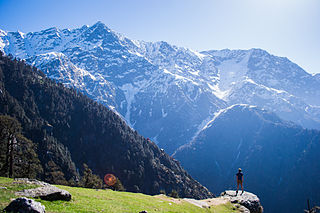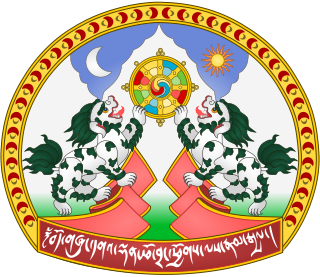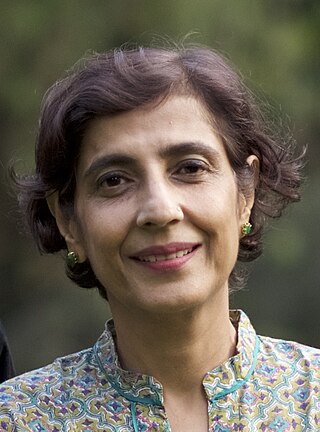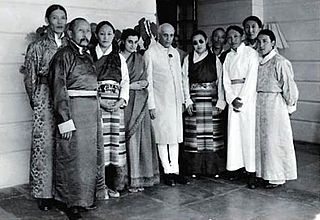
Dalai Lama is a title given by Altan Khan, the first Shunyi King of Ming China in 1578 AD at Yanghua Monastery to the foremost spiritual leader of the Gelug or "Yellow Hat" school of Tibetan Buddhism, the newest and most dominant of the four major schools of Tibetan Buddhism. The 14th and incumbent Dalai Lama is Tenzin Gyatso, who lives in exile as a refugee in India. The Dalai Lama is considered to be the successor in a line of tulkus who are believed to be incarnations of Avalokiteśvara, the Bodhisattva of Compassion.

Chushi Gangdruk was a Tibetan guerrilla group. Formally organized on 16 June 1958, the Chushi Gangdruk guerrilla fighters fought the forces of the People's Republic of China (PRC) in Tibet from 1956 to 1974.
Miss Tibet is an annual beauty pageant held in McLeod Ganj, India. It is produced by Lobsang Wangyal Productions.
Rangzen Shonu was a three-member rock band formed by Tenzin Choesang, Norbu Choephel and Tsering Paljor Phurpatsang. Tibetans in Dharamshala, India.

Dreaming Lhasa is a Tibetan-language film by veteran documentary filmmakers, Ritu Sarin and Tenzing Sonam, who have been making films about various aspects of Tibet under the banner of White Crane Films since 1990. Written by Tenzing, a first-generation Tibetan born and brought up in exile, Dreaming Lhasa is perhaps, the first Tibetan feature film to explore the state of exile and the issues of identity, culture and politics as they affect the Tibetan refugee community in India.
This is a list of topics related to Tibet.

The Tibetan Institute of Performing Arts (TIPA) was founded by Tenzin Gyatso, the 14th Dalai Lama on reaching McLeod Ganj, Himachal Pradesh, India in exile from Tibet in August 1959. It was then called Tibetan Music, Dance and Drama Society, which was one of the first institutes set up by the Dalai Lama, and was established to preserve Tibetan artistic heritage, especially opera, dance, and music.

McLeod Ganj or McLeodganj is a suburb of Dharamshala in Kangra district, Himachal Pradesh, India. It is known as "Little Lhasa" or "Dhasa" as the Tibetan government-in-exile is headquartered here and there is a significant population of Tibetans in the region.

The Sikyong is the political leader of the Central Tibetan Administration, a Tibetan exile organisation in India also known as the Tibetan Government-in-Exile based on the 2011 Charter of Tibetans-in-exile. The title was created in 2012 after the 14th Dalai Lama decided not to assume any political and administrative authority as the head of the Tibetan Administration for Tibetans-in-exile.

Lobsang Wangyal is a writer, social activist, photojournalist, and events producer, based in McLeod Ganj, Dharamshala, India. He has been a stringer reporter and photographer for Agence France-Presse for many years.

Tenzin Bagdro is a Tibetan Buddhist monk and former political prisoner who currently resides at Tashi Choeling Monastery in McLeod Ganj, Dharamshala, Himachal Pradesh, India, home of the Dalai Lama and the Tibetan government-in-exile.

Ritu Sarin is an Indian film director, producer and artist based in Dharamshala, India. She is the director of the Dharamshala International Film Festival.
Dr. Tsewang Yishey Pemba MBBS (London) FRCS was the first Tibetan to become a doctor in western medicine, and to become a Fellow of the Royal College of Surgeons. He founded the first hospital in Bhutan. He is also credited for writing the first work of fiction by a Tibetan in English, "Idols on the Path", published in 1966, and is also regarded as the first Tibetan to publish a book in English, "Young Days in Tibet", published by Jonathan Cape in 1957.

The Sun Behind the Clouds looks at China's occupation of Tibet from the perspective of the vocally secessionist Tibetan youth, and from that of their spiritual leader, the Dalai Lama, whose reaction to the Chinese presence has been markedly less confrontational. Directed by Ritu Sarin and Tenzing Sonam, the film features interviews with the Dalai Lama and Tenzin Tsundue. The Sun Behind the Clouds premiered in the United States at the 2010 Palm Springs International Film Festival before playing at Film Forum in New York City.

The Dharamshala International Film Festival (DIFF) is an international film festival held annually in the Himalayan town McLeod Ganj, Dharamshala in India — home to the Dalai Lama and the Tibetan community in exile since 2012. The 12th edition of DIFF was held from 4 to 7 November 2023, in McLeodganj, Dharamshala.

Tenzin Tsetan Choklay is a Tibetan filmmaker.

Lhasang Tsering is a Tibetan poet, writer, and activist. He was President of the Tibetan Youth Congress and a founding director of Amnye Machen Institute in Dharamshala, India. He is a vociferous and ardent advocate of Tibet's independence and a passionate lover of literature.

Tsering Dolma was the founder of the non-profit refugee organisation Tibetan Children's Villages and was the older sister of the 14th Dalai Lama, Tenzing Gyatso.

Thubten Samphel was a Tibetan writer, journalist, and government official. He worked as a secretary in the Ministry of Foreign Affairs and was a spokesperson of the Central Tibetan Administration, based in Dharamshala. He also worked for the administration's think tank, Tibet Policy Institute.
Tashi Tsering, born in 1929 in Guchok, Namling County, Shigatse prefecture, and died on December 5, 2014 (aged 84–85) in Lhasa, is a Tibetan of peasant origin, author of the autobiography, My fight for a modern Tibet, Life story of Tashi Tsering, where he describes the life he led successively in pre-communist Tibet, in exile in India and the United States, and finally back in China during the Cultural Revolution, between Tibet and Eastern China in the decades that followed.
















